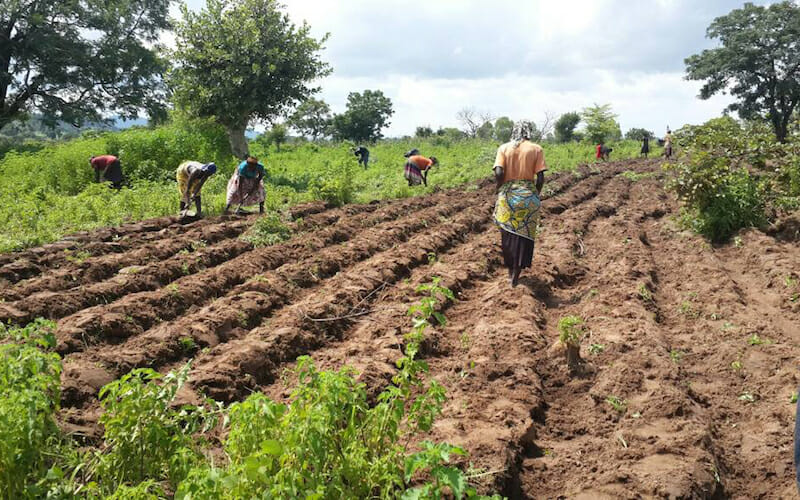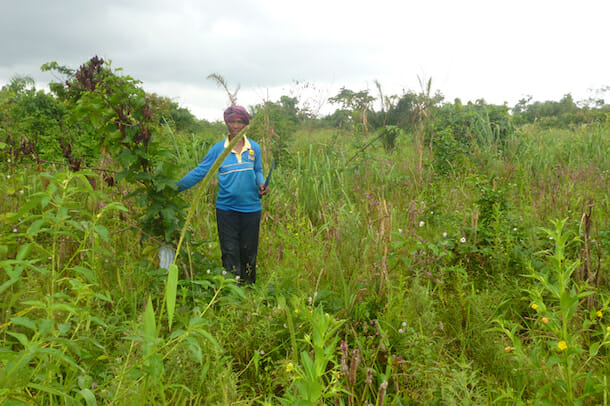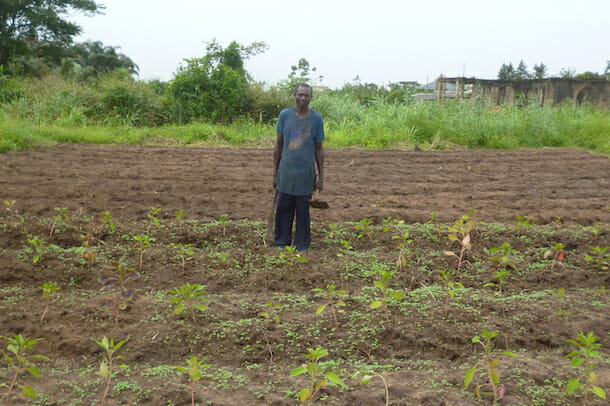
In Nigeria, Farmers Look to Innovative Ways of Fighting Climate Change, but Still Need Help Adapting
OGUN, Nigeria — Unpredictable amounts of rainfall and flooding caused by climate change in 2017 have submerged many states across Nigeria. Small-scale farmers in rural Nigeria are increasingly looking to innovative ways of dealing with the effects of climate change.
Adaptation strategies such as intercropping, construction of flood channels, diversifying crops, and scattering farms so that a farmer may have two to three plots are among the examples that provide farmers resilience.
Peter Ahaneku, Administrative Officer in the Nigeria Environmental Study Action Team (NEST), says flooding is a natural phenomenon that Nigeria will continue to experience due to rising sea levels, thereby exposing states along the coastal areas to flooding.
“The sea level has risen above normal and many states along the coastal areas would not be spared…The more we have rainfall, the more floods continue to happen.”
“When there is risen sea level, what this means is that people within flood plain regions would be exposed to a lot of dangers if they are not prepared. Agriculture also would not be spared and there [will] be hunger as a result,” NEST said.
National threat?
Before disaster struck many states across Nigeria, the Nigeria Meteorological Agency (NIMET) had in March 2017 warned that 23 out of 36 Nigerian states would be submerged by flooding, with the likelihood of a low yield of agricultural produce due to early cessation of rains.
Flooding is a major issue of concern, that effects a number of countries around the world, and Nigeria is no exception. Nationwide flooding in 2017 occurred in 17 states, including Benue State.
The highly variable rainfall, increasing temperature and frequent floods in Nigeria could lead to greater uncertainty thereby increasing food insecurity, according to Prof. Akinwunmi Omotayo, an expert in Agriculture and Rural Development Extension at the University of Agriculture Abeokuta, Ogun State.
A repeat of 2012 flooding, shows that Nigeria has lived with climate change without giving it much attention.
A major policy option to reduce the negative consequences of climate change is no doubt adaptation which is paramount for Nigeria’s smallholder farmers. These are the four major ways they are using adaptive strategies to aid their climate change adaption and improve food security.
Scattering of cultivated land areas
Ekaite Monday, after losing a huge amount of her vegetable and maize crops to flooding in March 2017, has learned to adapt by scattering her farmlands to mitigate her losses.
Monday, a mother of three and a smallholder farmer, owns scattered cultivated portion of lands situated in Solu village, a rural community located 3 kilometers away from the Ifo main market in Ifo, South Western Nigeria’s Ogun State.

Ekaite did not farm on one site but rather, she scattered her farms. This is a highly localized strategy which she says will help her avoid significant loses in case it rains heavily in one area but not in other areas.
“I have learnt to scatter my farms since the March 2017 flood destroyed my crops,” Ekaite says. She adds, “This will help me not to lose all my crops in case it rains heavily.”
Intercropping
Dr. Mayowa Fasona, Senior lecturer in the Department of Geography, University of Lagos and a Climate Change Environment and Natural Resource Management expert, says intercropping is most common of the adaptation methods used by farmers in South Western Nigeria. A farming method whereby a main crop is planted with one or two crops planted in-between as subsidiaries or low density.
Ekaite gave instances where she planted cassava as her main crops while maize and vegetables were planted as subsidiaries at a different time in the growing season. According to Ekaite, this method increases total crop harvest and maximizes the microclimate.
“We’ve learnt to intercrop cassava with varieties of other crops that are easier to grow but pay more,” she told me in an interview at her farm.
Diversification of crops
Smallholder farmers in Ogun do not depend on a single food crop but cultivate a diversity of crops on one or more plots of land. A method which allows them to avert risks and maximize harvest security under an unpredictable and an unreliable climate. It has the advantage of allowing all types of land to be used by local farmers.
For example, Patience James, another farmer in the Solu community of Ifo says she cultivates both uphill land and wetland since she cannot predict when the rains will come.
“My wetland farm is a clogged mass of water that stays waterlogged during the raining seasons, but is manageable during the dry seasons…so I plant both here and up the hill because I don’t even know when the rain would be coming,” she told me.
Construction of flood defenses and channels
Ibor Abel, a sixty-one-year old farmer, lost much of his cassava, vegetable, maize and tomato crops to floods in April, 2017, in Itele, a rural community located in Ado-Odo Ota, Ogun South Western Nigeria.

But after learning to adapt to changing weather conditions, his experience which he described as ‘painful annual losses’ have been reduced with increased crop yields.
“Construction of flood channels and defenses has been very much helpful in reducing my losses…Now my crops are doing well even when it rains heavily,” said Ibor.
Climate change
Climate change is not only in the Southwest, it is everywhere in Nigeria according to Prof. Akinwunmi Omotayo, an expert in Agriculture and Rural Development Extension at the University of Agriculture Abeokuta, Ogun State.
Prof. Akinwunmi Omotayo said “a lot of farmers, especially in rural Nigeria, have lost their means of livelihood as a result of climate change.”
Before the 2017 flood disaster struck, the Famine Early Warning System Network (FEWS NET) reported that more than 3,200,000 people would be food insecure at the peak of the lean season in 2017.
A 2015 study by the Nigerian Journal of Surveying & Geoinformatics reports that heavy rainfall and massive release of water from Oyan Dam was one of the major factors responsible for flooding in Ogun, disrupting both human and economic activities. The flooding also affected neighboring Lagos State.
According to Financial Intelligence, an online business magazine, agriculture makes up about 40% of Nigeria’s economy. Nigeria has over 80 million hectares of arable land.
Ogun contributes significantly to agricultural production. Ifo, Ado-odo/Ota and Obafemi Owode were cited as major flood prone regions.
Prof. Akinwunmi says that if the current trend of climate change continues and nothing is done to help farmers, Nigeria will experience food insecurity over the next 25 years.
“Petroleum has no future. Agriculture should be our focus because it’s the only sector of the economy that has sustainably supported our economy,” Prof. Omotayo told me.
Food insecurity
Nigeria, the seventh most populous country in Africa, is projected to surpass the 300 million people by 2050, according to the World Population Prospects 2017.
The havoc that the 2017 floods wrecked in 17 states across Nigeria, with more than 9,000 farmers loosing crops on 300,000 hectares of farm lands in Benue state alone, raises fears over impending food insecurity.
Mr. James Oyesola, Director Tree Crops and Rural Development Services in Ogun State Ministry of Agriculture, says flooding affects the availability, affordability and access to food.
Oyesola says that if farmers practice ecosystem based adaption which advocates synergy between food security and the environment, “they can go to sleep on the matter of mitigation and adaptation measures.”
Dr. Mayowa Fasona, a climate change expert, says tackling climate change is important and also not a difficult situation.
“You don’t just look at climate change and start tackling it, you need to start by reducing farmers’ vulnerability to climate change.”
“We need to engage with them, strengthen climate change information system, not just in collection but also in dissemination,” Fasona told me.
Needed help
Agriculture and Rural Development Extension expert, Prof. Akinwunmi, says adaptation is the way out but farmers have to be guided.
“Farmers are already adapting on their own but they need more help…We need government intervention in developing the agricultural sector.”
“If we put 50% of the efforts we are devoting to urban development to development of agriculture, we can be sure of food security and availability of food,” Prof. Akinwunmi adds.
Dr. Mayowa, climate change expert says agricultural extension in South Western Nigeria is dead: “we don’t see people from government offices going to talk to them.”
“We need to add it into our agriculture; Ogun State is one of the states that have the most fertile soil in South Western Nigeria,” Mayowa suggested.
Mayowa says farmers in rural Nigeria should be assisted by strengthening the climate change information system through improved agricultural methods and by investing more on crops that are ecologically profitable, with food crops that have a low gestation period.
